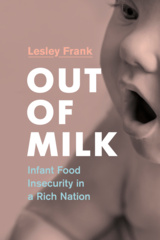
The Industrial Diet
The Degradation of Food and the Struggle for Healthy Eating
It has been called an epidemic, a health crisis, and a large-scale eating disorder. It is debated on daytime talk shows and in political arenas, written about in best-selling manifestos, and exposed in Oscar-nominated documentaries. Yet, despite all the media attention and the extensive natural science literature documenting the extent of the problem, few studies have looked seriously at the forces underlying our Western diet.
The Industrial Diet: The Degradation of Food and the Struggle for Healthy Eating chronicles the forces that have transformed a natural resource into an industry that produces edible commodities, an industry that far too often subverts our well-being and promotes disease instead of nourishing us. Tracing the industrial diet’s history from its roots in the nineteenth century through to present-day globalism, Anthony Winson looks at the role of technology, population growth, and political and economic factors in the constitution and transformation of mass dietary regimes and provides new evidence linking broad-based dietary changes with negative health effects in the developed and developing world. With its focus on the degradation of food and the emergent struggle for healthful eating, this book encourages us to reflect on the state of our food environments and to create realistic and innovative strategies that can lead to a healthier future.
Visit the author's website at theindustrialdiet.com.
This book will speak to academic and general audiences alike, particularly health and nutritional specialists and anybody with an interest in food and agriculture.
The Industrial Diet provides all the evidence anyone needs to understand the problems associated with our current food system and what to do about them. Anthony Winson is a compelling advocate for a more sustainable and, as he calls it, humane food regime.
In place of the systems of growing, selling, transporting, preserving, storing, and cooking that evolved into the cultural cuisines of the world, we are surrounded by edible commodities made from a handful of mass-produced ingredients, offered for low price and high convenience ... The challenge is to renew food cultures that link us to farms and kitchens, to families and communities. Winson gives us powerful knowledge to help reclaim the pleasures and solidarity of nourishing ourselves in ways that reconnect with soils, communities, and health.
Introduction
Part 1: Food Environments from Palaeolithic Times
1 Between Producers and Eaters: A Dietary Regime Approach
2 Discordant Diets, Unhealthy People
3 From Neolithic to Capitalist Diets
Part 2: The Beginnings of the Industrial Diet, 1870-1949
4 From Patent Flour to Wheaties
5 Pushing Product for Profit: Early Branding
Part 3: The Intensification of the Industrial Diet, 1940-80
6 Speeding Up the Making of Food
7 The Simplification of Whole Food
8 Adulteration and the Rise of Pseudo Foods
9 The Spatial Colonization of the Industrial Diet: The Supermarket
10 Meals Away from Home: The Health Burden of Restaurant Chains
Part 4: Globalization and Resistance in the Neo-Liberal Era
11 The Industrial Diet Goes Global
12 Transformative Food Movements and the Struggle for Healthy Eating
13 Case Studies of a Transformative Food Movement
14 Towards a Sustainable and Ethical Health-Based Dietary Regime
Notes, Index









